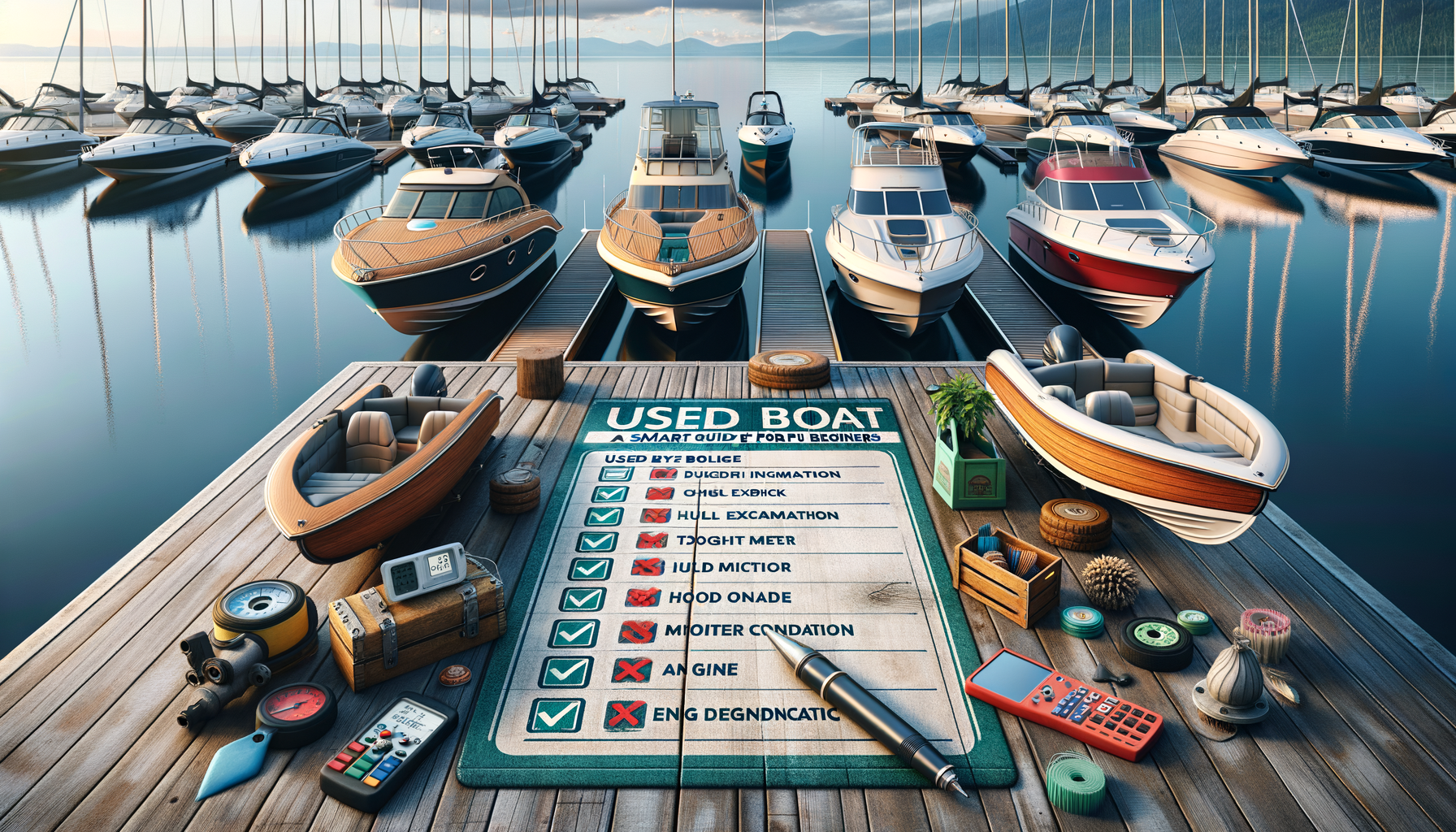The Appeal of Used Boats
Used boats offer a unique opportunity for boating enthusiasts to indulge in their passion without the hefty price tag of a new vessel. The market is filled with diverse options, from sleek speedboats to classic sailboats, each carrying its own story and character. Buying a used boat can be an exciting journey, allowing you to find a vessel that suits your style and preferences without stretching your budget.
One of the primary advantages of purchasing a used boat is cost-effectiveness. New boats depreciate quickly, losing a significant portion of their value within the first few years. By opting for a used boat, you can avoid this initial depreciation hit. Additionally, the lower purchase price often means you can afford a larger or more feature-rich boat than if you were buying new.
Another appealing aspect of used boats is the variety available. The pre-owned market is vast, offering everything from small fishing boats to luxury yachts. This diversity allows buyers to find a boat that meets their specific needs, whether it’s for leisurely weekends on the lake or adventurous ocean voyages. Furthermore, many used boats come with added equipment or upgrades from previous owners, enhancing their value.
However, it’s essential to approach the used boat market with a discerning eye. Conducting thorough research and inspections is crucial to ensure you’re making a wise investment. Understanding the boat’s history, condition, and any potential maintenance needs will help you make an informed decision and enjoy your time on the water without unexpected surprises.
Key Considerations When Buying a Used Boat
When venturing into the world of used boats, there are several key factors to consider to ensure a successful purchase. First and foremost, it’s important to define your needs and preferences. Consider the type of boating activities you plan to engage in, such as fishing, cruising, or water sports. This will help narrow down the options and guide you towards a boat that suits your lifestyle.
Once you’ve identified your needs, it’s time to delve into the specifics of the boats you’re interested in. Begin by examining the hull, as it is the most critical part of the vessel. Look for any signs of damage, such as cracks, blisters, or repairs. A thorough hull inspection can reveal potential issues that may affect the boat’s performance and safety.
In addition to the hull, pay close attention to the engine and mechanical systems. Check the engine’s age, hours of use, and maintenance history. A well-maintained engine is crucial for reliable performance on the water. Don’t hesitate to ask for service records and, if possible, have a marine mechanic conduct a comprehensive inspection.
Another important consideration is the boat’s ownership history. Verify that the seller has clear title to the boat and that there are no outstanding liens. This will prevent legal complications and ensure a smooth transfer of ownership. Additionally, inquire about any past accidents or major repairs, as this information can impact the boat’s value and future maintenance needs.
Finally, consider the overall condition of the boat’s interior and amenities. Check for signs of wear and tear, such as upholstery damage or outdated electronics. While cosmetic issues can often be addressed, they may indicate a lack of maintenance. By thoroughly evaluating these factors, you can make a well-informed decision and find a used boat that offers both value and enjoyment.
Understanding Boat Financing and Ownership Costs
Purchasing a used boat involves more than just the initial price tag; it’s essential to understand the financial aspects of boat ownership to make a sound investment. One of the first steps is to explore financing options. Many financial institutions offer loans specifically for boat purchases, allowing you to spread the cost over time. It’s important to shop around for competitive interest rates and terms that align with your budget.
In addition to the purchase price and financing, consider the ongoing costs of boat ownership. These include insurance, storage, maintenance, and fuel expenses. Boat insurance is crucial for protecting your investment and providing peace of mind on the water. Premiums can vary based on factors such as the boat’s age, type, and usage, so it’s wise to obtain quotes from multiple insurers.
Storage is another significant expense, especially if you don’t have space to keep the boat at home. Options include marina slips, dry storage facilities, or trailer storage. Each option has its own costs and benefits, so evaluate them carefully based on your location and convenience.
Maintenance and repairs are inevitable aspects of boat ownership. Regular upkeep, such as cleaning, engine servicing, and hull maintenance, ensures the boat remains in good condition and retains its value. It’s advisable to set aside a budget for unexpected repairs and upgrades, as these can arise over time.
Lastly, fuel costs will depend on the type of boat and how often you use it. Larger boats and those with powerful engines tend to consume more fuel, so factor this into your budget if you plan on frequent outings. By understanding these financial aspects, you can enjoy your boating experience without encountering unforeseen financial challenges.
Tips for Making an Informed Purchase
To make a well-informed purchase when buying a used boat, it’s essential to follow a few practical tips that can help you navigate the process with confidence. Begin by conducting thorough research on the types of boats that align with your needs. Online resources, boating magazines, and forums are valuable sources of information that can provide insights into different boat models and their performance.
Next, consider working with a reputable boat broker or dealer. These professionals have extensive knowledge of the market and can guide you through the buying process. They can also help you find boats that meet your criteria and negotiate favorable terms with sellers. While brokers charge a commission, their expertise can be invaluable in ensuring a smooth transaction.
Before finalizing a purchase, always conduct a sea trial. This on-water test allows you to evaluate the boat’s handling, performance, and comfort. Pay attention to how the boat responds to steering, acceleration, and various water conditions. A sea trial can reveal potential issues that may not be apparent during a dockside inspection.
Another crucial step is to obtain a professional marine survey. A surveyor will conduct a comprehensive examination of the boat, assessing its condition, value, and any necessary repairs. This report provides an unbiased evaluation and can be a valuable negotiating tool when discussing the price with the seller.
Finally, trust your instincts. If something feels off or if the seller is reluctant to provide information, it’s wise to walk away and explore other options. There are plenty of used boats available, so don’t rush into a decision that doesn’t feel right. By following these tips, you can make a confident and informed purchase that leads to years of enjoyable boating experiences.
Affordable Boating: Enjoying the Water on a Budget
Boating doesn’t have to be an expensive hobby reserved for the wealthy. With careful planning and smart choices, you can enjoy the pleasures of the water without breaking the bank. One of the most effective ways to save money is by purchasing a used boat, as discussed earlier. However, there are additional strategies to keep costs manageable while still having a fantastic time on the water.
Consider joining a boating club or fractional ownership program. These options allow you to share the costs of boat ownership with others, significantly reducing expenses. Boating clubs often provide access to a fleet of boats, offering variety and flexibility without the commitment of owning a single vessel. Fractional ownership involves co-owning a boat with a group, sharing both the costs and the usage.
Another budget-friendly option is to rent a boat. Renting allows you to enjoy boating without the responsibilities and costs of ownership. Many rental companies offer a range of boats for various activities, from fishing to cruising. Renting is an excellent choice for occasional boaters or those looking to try different types of boats before making a purchase.
When it comes to maintaining a boat on a budget, regular maintenance is key. Performing routine checks and addressing minor issues promptly can prevent costly repairs down the line. Additionally, learning basic DIY maintenance skills can save money on labor costs. There are numerous online resources and tutorials available to help you tackle simple maintenance tasks.
Lastly, consider the location of your boating activities. Choosing destinations closer to home can reduce travel expenses and allow for more frequent outings. Local lakes, rivers, and coastal areas often offer beautiful scenery and exciting opportunities for exploration. By implementing these strategies, you can enjoy the joys of boating without straining your finances.




Leave a Reply